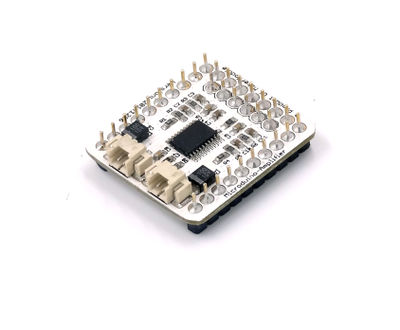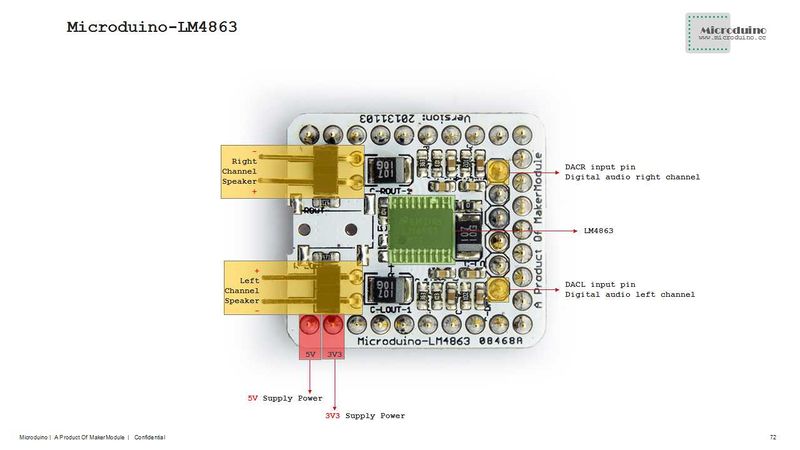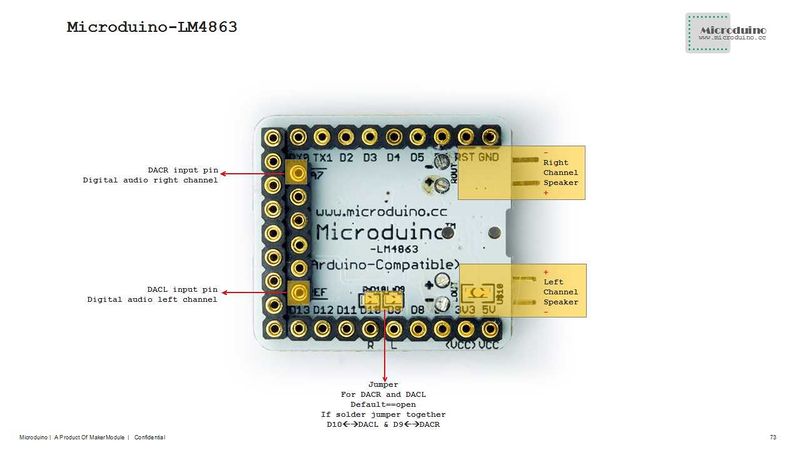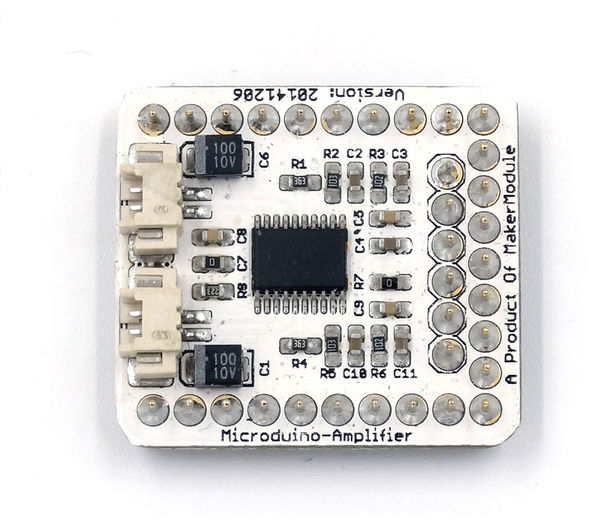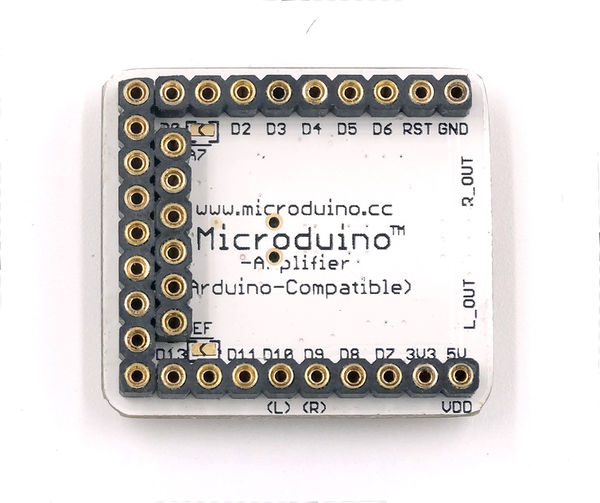Difference between revisions of "Microduino-LM4863"
From Microduino Wiki
| (2 intermediate revisions by one other user not shown) | |||
| Line 1: | Line 1: | ||
| + | {{Language|Microduino-LM4863}} | ||
{| style="width: 800px;" | {| style="width: 800px;" | ||
|- | |- | ||
| | | | ||
[[file:Microduino-LM4863-rect1.jpg|400px|thumb|right|Microduino-LM4863]] | [[file:Microduino-LM4863-rect1.jpg|400px|thumb|right|Microduino-LM4863]] | ||
| − | Microduino- | + | Microduino-LM4863 is a D-Class Amplifier Module. Widely used in music embedded system. |
|- | |- | ||
| | | | ||
| − | == | + | ==Feature== |
| − | *2. | + | *2.54 Connector with good compatibility; |
| − | * | + | *Suppress power noise, gain stability; |
| − | * | + | *Small, cheap, stackable, opened platform |
| − | * | + | *Open source hardware circuit design, compatible with the Arduino IDE development environment for programming; |
| − | * | + | *Define unified interface Microduino specification and contain rich peripheral modules. Set up the quick connection with other Microduino modules and sensors easily and flexibly; |
| − | *2. | + | *2.54 pitch row female connector for easy integration into breadboard. |
| Line 19: | Line 20: | ||
| | | | ||
==Specifications== | ==Specifications== | ||
| − | * | + | *Provide 2.2W output for 4Ω load; |
| − | * | + | *Operating Voltage:2.0-5.5V; |
| − | * | + | *Externally controlled, low-power shutdown mode, typical shutdown current of 0.7uA. |
[[File:LM4863-Pinout-2.jpg|800px|thumb|center|Microduino-LM4863-Pinout]] | [[File:LM4863-Pinout-2.jpg|800px|thumb|center|Microduino-LM4863-Pinout]] | ||
[[File:LM4863-Pinout-1.jpg|800px|thumb|center|Microduino-LM4863-Pinout]] | [[File:LM4863-Pinout-1.jpg|800px|thumb|center|Microduino-LM4863-Pinout]] | ||
| − | == | + | ==Document== |
Eagle PCB '''[[File:Microduino-LM4863.zip]]''' | Eagle PCB '''[[File:Microduino-LM4863.zip]]''' | ||
| − | === | + | ===Main Component=== |
| − | * | + | *Amplifier chip:LM4863 '''[[File:LM4863.pdf]]''' |
| − | == | + | ==Development== |
| − | * | + | *Make sure the 5V power supply current can reach 500ma, not recommended use FT232R debugging directly, becasue FT232R's output current is small. |
| − | === | + | ===Arduino library and supported package=== |
| − | * | + | *【SimpleSDAudio library'''[[http://www.hackerspace-ffm.de/wiki/index.php?title=SimpleSDAudio download ]''' 】 |
| − | * | + | *【SimpleSDAudio updated library '''[[File:Lib SimpleSDAudio.zip]]''' 】 |
| − | === | + | ===How to use the library=== |
| − | * | + | *Original library SD module CS pin is D4, need change to D7; |
| − | * | + | *Original library can not directly support Microduino Core +, we have modified this library to solve this problem; |
| − | * | + | *Recommend 2GB or less (including 2GB) FAT format TF card. |
| − | === | + | ===Externally controlled low-power shutdown=== |
| − | * | + | *In many applications, the shutdown port's level conversion is finished by the controller, but it can also be used to implement by a one-way blade switch; |
| − | ** | + | **Connect a pull-up resistor on the third pin of Second row pin female which near the D13 pin, then disconnect switch, this pin will be pulled low, so the Amplifier begin to work; |
| − | ** | + | **Turn on the switch,pull-up resistor will pull up the voltage, then LM4863 stop work. |
| − | == | + | ==Application== |
| − | === | + | ===Program Download=== |
| − | * | + | *Audio file conversion tool:'''[[File:Tools_lm4863.zip]]''' |
| − | === | + | ===The Audio experiment using Core and SD=== |
| − | * | + | *Prepared Hardware:Microduino FT232R、Microduino Core、Microduino SD、Microduino LM4863; |
| − | * | + | *Prepared Software:Arduino IDE(1.0 release upper)、Microduino provides test program(Arduino part)、SimpleSDAudio library、Audio file creation tools; |
| − | * | + | *Put the downloaded library to the libraries folder of Arduino IDE installation; |
| − | * | + | *Copy the "EXAMPLE.AFAM" in examples folder to memory card; |
| − | * | + | *Start Arduino IDE,open the "BareMinimum" program,card type chosse "Microduino Core (Atmega328P@16M,5V)",download directly; |
| − | * | + | *Then you can listen it! |
| − | ** | + | **If you want to play your own audio, just need replace the "EXAMPLE.AFM" by you made audio file. |
| − | |||
| − | |||
| − | |||
| − | |||
| − | |||
| − | |||
| − | |||
| − | |||
| + | ===The process to make an audio file=== | ||
| + | *Convert any audio file into a. Wav format using a software "Format Factory"; | ||
| + | *Generate an audio file: | ||
| + | **We need to use a SoX-based tool, and then choose the appropriate conversion process based on the operating frequency that your Microduino selected; | ||
| + | **Decompression the tool,then enter into“Arduino with 16 MHz”folder,put the audio file into this folder,and drag to "FullRate@16MHz_Stereo.bat" (16M full stereo) batch on; | ||
| + | **then you can convert the file, will pop up a dialog box appears "Press any key to continue ..."; | ||
| + | **After completed, you will find a new folder, the converted file is there. | ||
==Pictures== | ==Pictures== | ||
Latest revision as of 01:41, 16 February 2014
| Language: | English • 中文 |
|---|
|
Microduino-LM4863 is a D-Class Amplifier Module. Widely used in music embedded system. |
Feature
|
Specifications
DocumentEagle PCB File:Microduino-LM4863.zip Main Component
Development
Arduino library and supported package
How to use the library
Externally controlled low-power shutdown
ApplicationProgram Download
The Audio experiment using Core and SD
The process to make an audio file
Pictures
|
